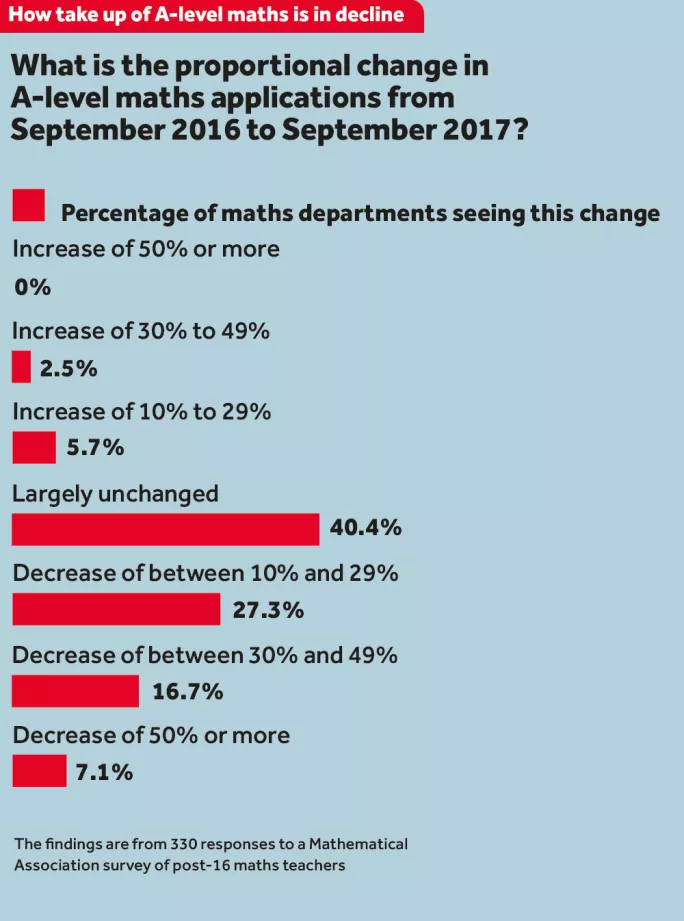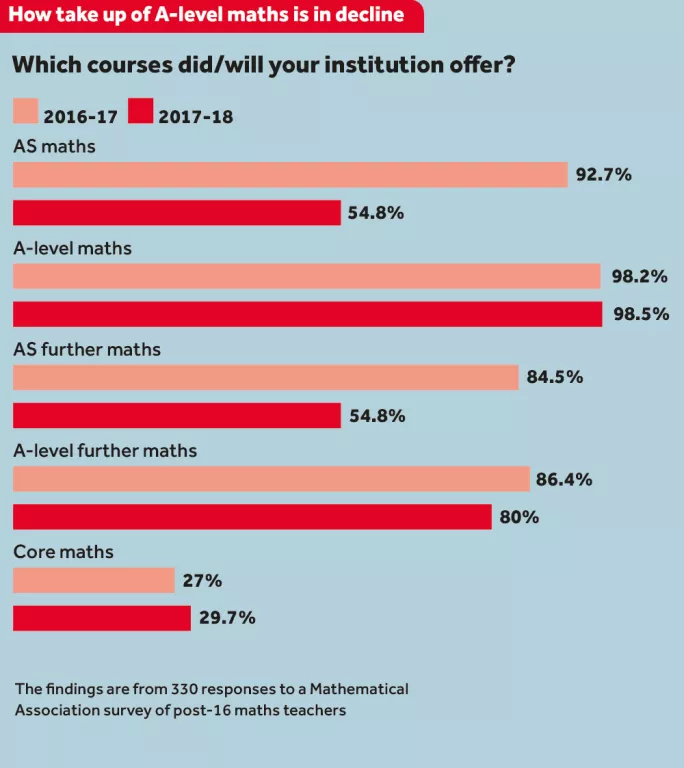‘It’s a bloody disaster...stop meddling in maths’

Maths teachers warned that it was going to happen - and now they have been proved right.
An “alarming” decline in the number of 16-year-old students willing to continue studying maths after taking this year’s tougher GCSE has been revealed by new research.
The Mathematical Association’s study, shared with Tes, also shows that schools and colleges have cut back on the maths courses they offer in response to funding changes and the move to linear A levels from the old A/AS-level modular system.
More than half of the maths departments surveyed by the association reported a decrease of at least 10 per cent in applications to start A-level maths in September, compared with September 2016.
Applications for A-level further maths have also fallen sharply - one in four maths departments said they were expecting no more than half the number they had this year.
“The scale of these potential decreases is alarming,” warns David Miles, spokesman for the Mathematical Association, a subject association for school and university maths teachers. “Many comments revealed a sense of despair, bitterness and anger that the hard-won advances in the popularity of both A levels will apparently be undone by the simultaneous introduction of multiple significant reforms.”
The anonymous opinions of teachers who participated in the survey were stark. “It’s a bloody disaster,” one said.
“We’ve all dedicated our professional lives to building these numbers, only for everything to be ruined by a handful of uninformed meddlers,” another commented.
“Well done to the government for reversing the take-up of maths - idiots,” said a third.
Maths has become the most popular A-level subject in recent years - after a massive 18.5 per cent drop in A-level entries in 2002, following the unexpectedly low AS grades that resulted from the introduction of Curriculum 2000 exam reforms.
‘Too tough for pupils’
The new drop in entries is also being blamed on exam reform. This time, the new “big, fat” maths GCSE - tougher and with more content - is cited as a major reason for the drop off in interest post-16.
“The significant increase in demand [in the GCSE] has had a terrible impact on student confidence,” Miles says. “Teachers have struggled to grade work on the 9-1 scale and their understandable caution when awarding the highest grades may have led students to believe they may not satisfy entry requirements.”
Maths teachers had already flagged up the problems that are now emerging.
Warnings about the effect of government reforms on the take-up of A-level maths stretch back to at least 2014, when the A-level content advisory board - made up of academics from leading universities - wrote to the Department for Education. It said that “proposed changes to GCSE, and the introduction of core maths, could all put a downward pressure upon student uptake at A level”.
The board added that the decoupling of AS and A level also made maths a “higher risk option” than other subjects for 16-year-olds, and it warned that “the threat to further maths is even greater.”
“We know, from the consequences of changes initiated by Curriculum 2000, that the introduction of significant changes requires time and careful planning in order to prevent serious damage to uptake across mathematics A level,” the board wrote.
In April this year, the Mathematical Association highlighted “multiple issues ... affecting the take-up of post-16 maths next year”. “Alarm bells ought to be ringing,” it said.
The following month, Sue Pope, of the Association of Teachers of Mathematics, warned that the overall impact of the new maths GCSE this summer “will be negative in terms of take-up at A level”.
“The real crisis will come when they suddenly say in 2019, ‘Where have all the A-level mathematicians gone?’” she said.
“The whole thing is a nightmare waiting to happen. What’s so frustrating is we can all do the analysis but why isn’t the DfE doing the analysis? Why are they not taking these things seriously?”
Now, the responses from maths teachers taking part in the association’s survey suggest those fears were more than justified.
One wrote that the new GCSE has “completely destroyed” the confidence of students who have “had enough of maths”.
However, not everyone thinks that the tougher and bigger maths GCSE is an entirely bad idea.
New GCSE ‘mishandled’
Craig Barton, Tes’ maths specialist, says that the negative impact from the introduction of the qualification is “a real shame”.
But he adds: “The thing with the 9-1 GCSE is it’s a far better preparation for A level than the legacy GCSE.
“There is more geometry and the algebra is more complex. The massive jump between GCSE and A level will be less.
“But I think it comes down to the fact that the GCSE has been so mishandled and there has been so much uncertainty about how it would be assessed, and I think that has knocked confidence. What a terrible tragedy that numbers have dropped.”
The latest research also shows that maths departments are far less likely to offer AS levels in maths or further maths next year.
Some 92 per cent of those surveyed by the Mathematical Association said they offered AS-level maths this year - but just 55 per cent intended to do so in September.
Similarly, the proportion offering AS-level further maths is expected drop from 85 per cent this year to 55 per cent next year.
The drop in AS levels being offered is blamed on funding changes in post-16 education, which have meant that many sixth-form colleges have phased out the practice of letting students start four AS levels and then drop one after a year. Instead, pupils are now enrolled on three A levels from the start.
The DfE was contacted for comment.


You need a Tes subscription to read this article
Subscribe now to read this article and get other subscriber-only content:
- Unlimited access to all Tes magazine content
- Exclusive subscriber-only stories
- Award-winning email newsletters
Already a subscriber? Log in
You need a subscription to read this article
Subscribe now to read this article and get other subscriber-only content, including:
- Unlimited access to all Tes magazine content
- Exclusive subscriber-only stories
- Award-winning email newsletters